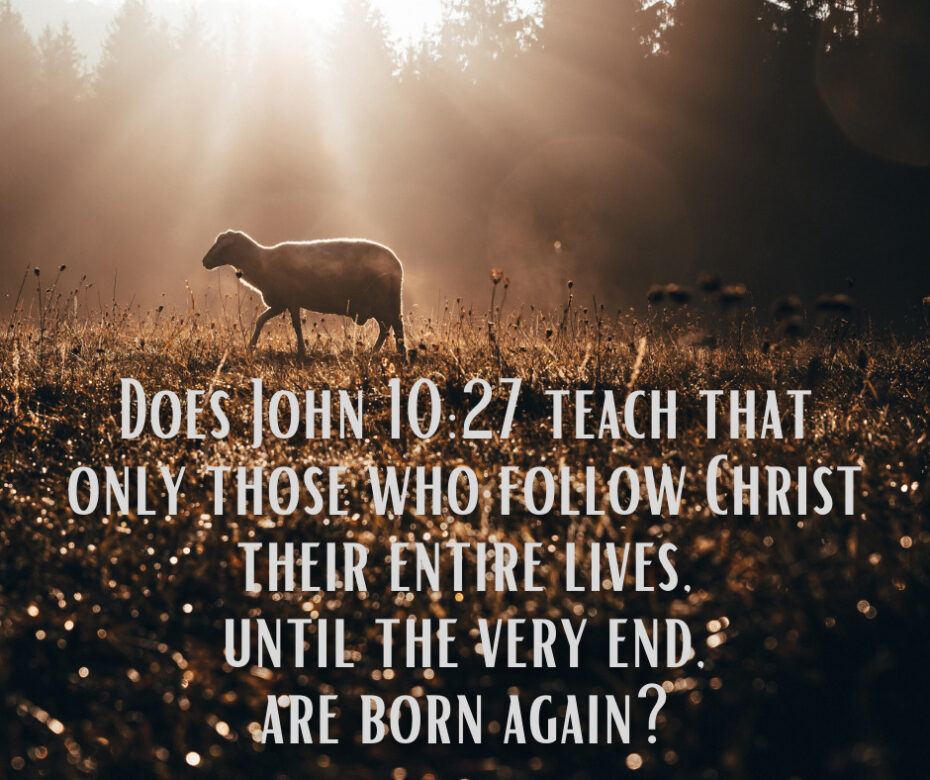Michael asks a great question:
John 10:27 is used by certain groups to say that a true believer will always want to hear every word of Christ and will follow anything He commands (these people reject salvation being an event and instead believe that salvation is a lifelong process, that the person has to breathe his last breath while in the faith and being obedient).
I do not believe what they teach. My best explanation for John 10:27 is that a believer’s new creature always follows Christ, not the believer’s fleshly body; a believer follows Christ positionally because he/she has His perfect righteousness imputed to him/her.
I would like to hear your insight on the passage.
Scripture never contradicts Scripture. Unless and until that becomes a non-negotiable aspect of our Bible study, we will experience lots of confusion. Michael’s question is an example.
Michael knows that principle, but he does not state it. I would suggest it is best when discussing an issue like this with others, that we come right out and state the principle. Show them the simple promise of everlasting life for those who simply believe in Him for it in verses like John 3:16 or 6:35, 47 or 11:25-27. That is step one. The word follow does not occur in any of those verses.
Step two is to show that one is born again and eternally saved the moment he believes in Jesus. The Lord promises that the one who believes now will never perish, will never hunger or thirst, will never come into judgment regarding everlasting life, and will never die spiritually. The idea that salvation is a process is totally contradicted over and over again by the Lord Jesus.
Step three is to attempt to explain John 10:27 if you can. Michael’s interpretation is new to me. But it is possible.
Another option, the one suggested by Zane Hodges, is that sheep following a shepherd illustrates faith in Christ (The Gospel Under Siege, pp. 82-83). For support he writes, “Why does Jesus say, ‘They follow Me and I give them eternal life’, rather than, ‘I give them eternal life and they follow Me’? It sounds as though the giving of eternal life is the result of His sheep following Him. As a matter of fact, this conclusion is undoubtedly correct!” (p. 83). He goes on to point out that John 10:27-28 has all the same elements as John 5:24.
A third option is that they follow Me is a figure of speech for eternal security along with “and I give them eternal life.” That is, they will go where He goes. Compare John 13:36, “Simon Peter said to Him, ‘Lord, where are You going?’ Jesus answered him, ‘Where I am going you cannot follow Me now, but you shall follow Me afterward.’” (See also John 14:3.)
Earlier in John 10 the sheep literally go where the shepherd goes (v 4). It is possible that is the point in v 27 too.
I am torn between the second and third options. But whatever John 10:27 means, it does not contradict scores of faith-alone verses in John’s Gospel and the rest of the NT.
Finally, step four is to compare the uses of the verbs believe and follow in John’s Gospel. The word believe (pisteuō) occurs 99 times in the Critical Text and 100 times in the Majority Text. The word follow (akoloutheō) occurs only 19 times in John, and most of the uses in John literally refer to following Him where He goes. Neither of the two uses that refer to following His teachings are in salvific contexts (12:26; 21:19).
Merrill Tenney famously called the Gospel of John “the Gospel of belief.” I’m not familiar with a single person who ever called it, “the Gospel of following.” Only someone who wished to impose his own views on the Gospel of John would ever suggest the view that Michael encountered.


